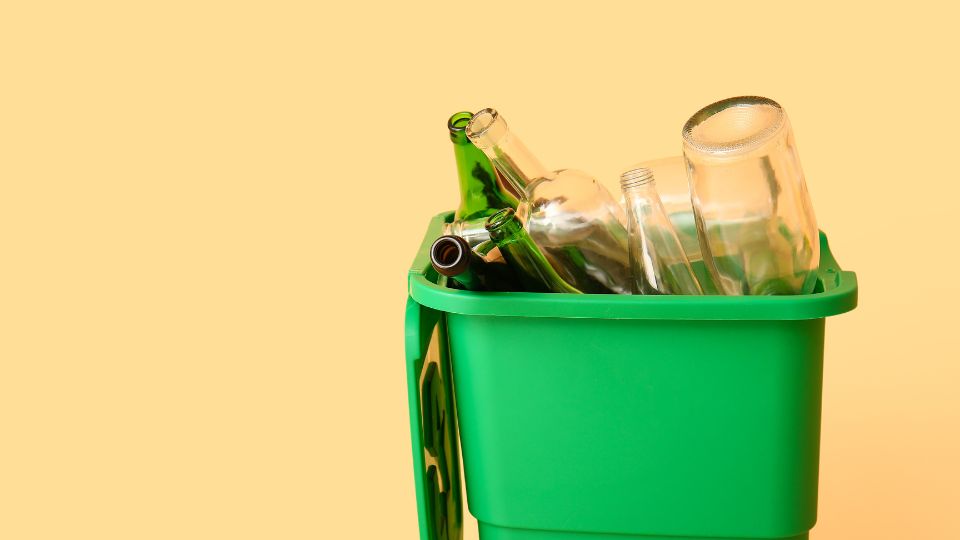
Quick Summary:
- Learn about the lifecycle of recycled glass and its environmental benefits.
- Discover the advantages of proper glass disposal and the risks associated with improper recycling.
- Explore best practices for effective glass waste management to enhance sustainability and operational efficiency.
As a UK business owner, you’re likely aware of the importance of effective waste management for sustainability and operational efficiency.
Among various waste types, glass waste management is critical due to its unique properties and recycling potential.
In this blog, we’ll delve into what happens to glass waste, how proper glass disposal benefits your business and the environment, and what can go wrong if glass waste is not handled correctly.
Table of Contents
- Understanding Glass Waste
- What Happens to Recycled Glass in the UK?
- The Benefits of Proper Glass Waste Disposal
- What Happens If Glass Waste Is Not Recycled Properly?
- Conclusion
Understanding Glass Waste
Glass is a versatile and highly recyclable material that, when managed properly, can significantly reduce environmental impact.
From bottles and jars to packaging materials like bubble wrap, glass waste is common in many UK businesses.
Effective glass waste management supports your corporate sustainability goals and complies with regulatory requirements.
What Happens to Recycled Glass in the UK?

In the UK, glass recycling is a well-established process that contributes to significant environmental benefits. Here’s a step-by-step overview of what happens to recycled glass:
- Collection and Sorting: Glass is collected from various sources, including commercial establishments and households. It’s then transported to recycling facilities where it’s sorted by colour and type.
- Cleaning and Processing: Once sorted, the glass undergoes a thorough cleaning process to remove any impurities such as labels, caps, and residues. It’s then crushed into small pieces called cullet.
- Melting and Reforming: The cullet is melted in a furnace at high temperatures. This molten glass is then moulded into new glass products, such as bottles, jars, and even construction materials.
- Manufacturing New Products: The recycled glass can be used to produce new glass containers, reducing the need for raw materials and lowering energy consumption. This closed-loop recycling process conserves resources and reduces landfill waste.
The Benefits of Proper Glass Waste Disposal
Proper glass disposal and recycling offer numerous advantages:
- Environmental Impact: Recycling glass reduces the need for raw materials, lowers energy consumption, and decreases greenhouse gas emissions.
- Economic Efficiency: Recycling glass conserves resources and reduces manufacturing costs, which can be advantageous for businesses involved in the production and use of glass products.
- Regulatory Compliance: Following proper glass recycling practices helps ensure compliance with environmental regulations and avoids potential fines.
What Happens If Glass Waste Is Not Recycled Properly?

If glass waste is not recycled properly, several negative consequences can occur:
Environmental Pollution:
Improperly disposed glass can end up in landfills, where it takes hundreds to thousands of years to break down. This not only contributes to landfill overflow but can also result in the release of toxic substances.
Glass debris in the ocean can injure marine animals and disrupt delicate ecosystems. Proper disposal and recycling of glass are crucial for protecting our environment and preserving natural habitats
Resource Wastage:
When glass is not recycled, the opportunity to reuse valuable materials is lost. This increases the demand for raw materials and the associated environmental impacts of their extraction and processing.
Increased Costs:
Poor glass waste management can lead to higher disposal costs and potential regulatory penalties for non-compliance.
Loss of Economic Benefits:
By not recycling glass properly, businesses miss out on the economic benefits of recycling, including potential cost savings and resource conservation.
Conclusion
Effective waste management is crucial for reducing environmental impact and enhancing business sustainability.
By understanding what happens to glass waste, implementing proper disposal practices, and recognising the consequences of improper recycling, UK businesses can contribute to a greener future while reaping the economic benefits of recycling.
For more information on glass waste disposal and how your business can improve its waste management strategies, contact our team of experts today.
Let’s work together to make waste management more efficient and environmentally friendly.







